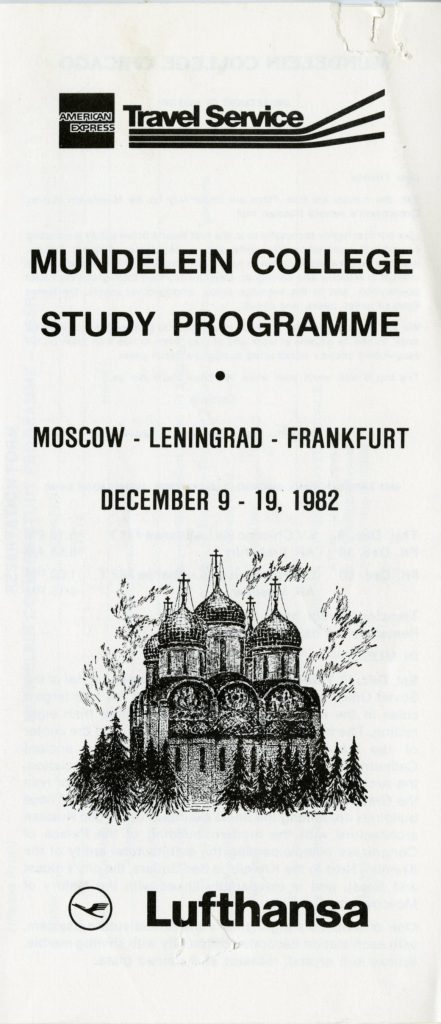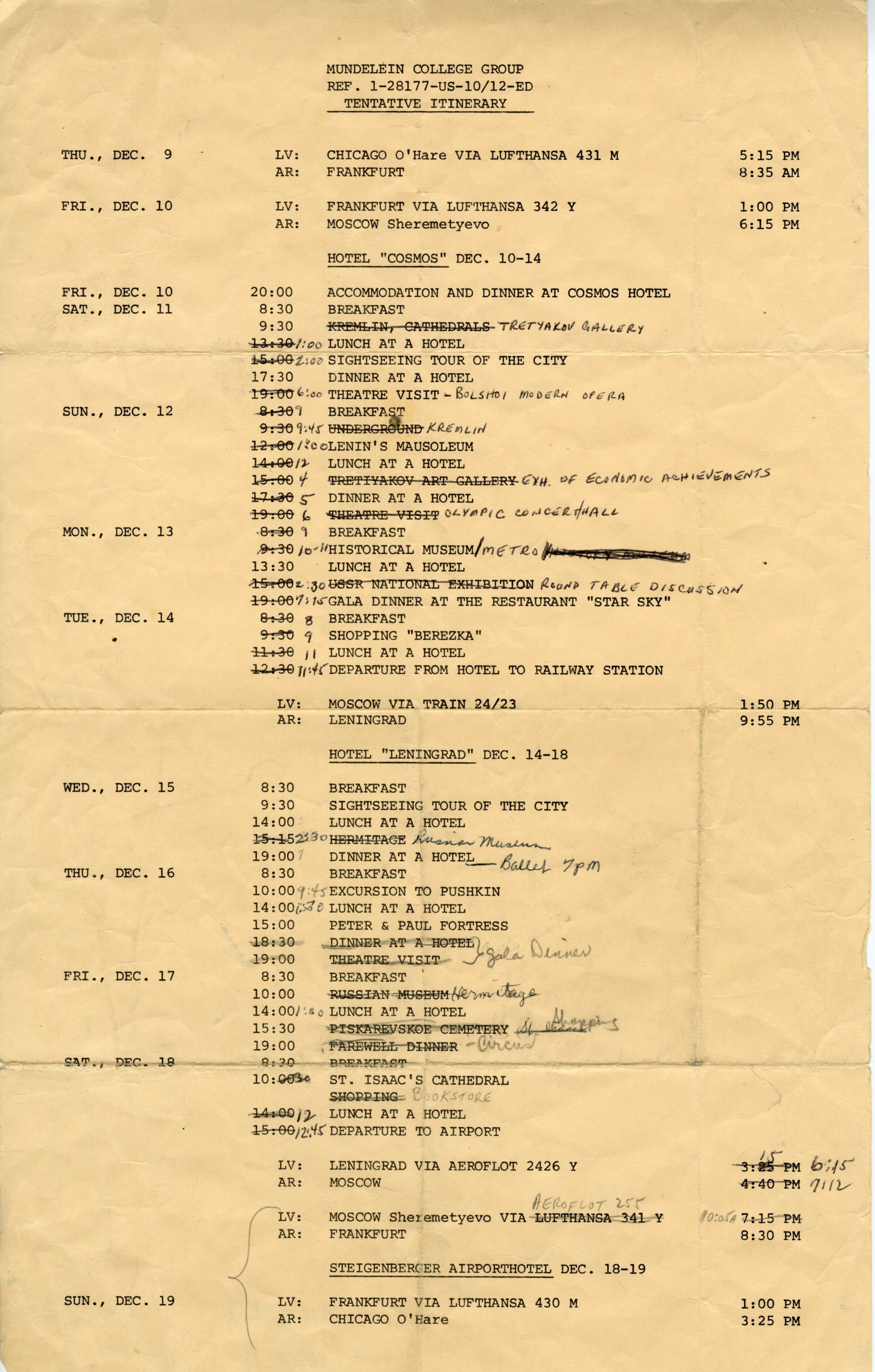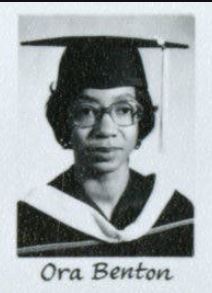This past September I attended the Class of 1968 Reunion/Gannon Center 25th Anniversary to help work an oral history listening station. While I was there, I talked with a Mundelein graduate that went on a study abroad trip to the Soviet Union. She mentioned that some girls on the trip brought blue jeans with them to sell to Russians. I was interested in the idea that some women on the trip smuggled goods into the country, and decided to look into the 1982 Soviet Union study abroad trip in our archives. In the Alumnae series of the Mundelein College collection I found an account of the trip from 1980 Mundelein graduate, Ora Benton.
 Ora was busy packing her bags for the trip. She had to fit everything she needed for the ten-day trip, but she was not worried about space; she was worried about getting through Soviet customs. Ora, and forty-three other students, alumnae, and friends of Mundelein College* were preparing for a study abroad trip to the Soviet Union in December of 1982. Shortly after Mundelein planned the trip the Chicago Action for Soviet Jewry (CASJ) contacted Ora and other participants of the study abroad trip. The organization asked the students to help them deliver gifts and religious material to “Refusenik” families in the Soviet Union.
Ora was busy packing her bags for the trip. She had to fit everything she needed for the ten-day trip, but she was not worried about space; she was worried about getting through Soviet customs. Ora, and forty-three other students, alumnae, and friends of Mundelein College* were preparing for a study abroad trip to the Soviet Union in December of 1982. Shortly after Mundelein planned the trip the Chicago Action for Soviet Jewry (CASJ) contacted Ora and other participants of the study abroad trip. The organization asked the students to help them deliver gifts and religious material to “Refusenik” families in the Soviet Union.
Refusenik families were Soviet-Jewish families that wanted to emigrate, but the USSR refused to grant them exit visas. The women were immediately hesitant to help the CASJ. Visiting the Soviet Union during the Cold War was already nerve-wracking and now the organization wanted them to smuggle in religious “contraband.” A representative with the Chicago Action for Soviet Jewry assured them the actions were neither illegal nor dangerous. Ora and her classmate ultimately conceded to visiting one family in Moscow and one in Leningrad. Gifts for the families included menorahs, bibles, Jewish reading material, clothes, and food. What the women did not know was the Soviet Union had strict laws prohibiting the distribution and teaching of religious material.
Arriving in the Frankfurt Airport, the bags made it through customs with only a small issue of metal casing on the bible setting of the detector. While the women were not particularly worried about security in Frankfurt, the metal detector scare on the bible increased anxiety about bag checks in the Soviet Union. After landing in Moscow, both Ora and her classmate made it through customs without any issues. The customs officials did not flag of confiscate any material in the suitcases.

Once in the Soviet Union, tour guides kept the group busy with a packed itinerary. Despite their busy schedule, Ora and her classmate found time to make their way to the first Jewish household. Still uneasy and concerned about surveillance, the women were careful not to use their hotel phone or call a taxi to the hotel. Ora recalled finding a taxi after walking down a couple blocks from the hotel. At the first home, they met an American whose father brought him to the Soviet Union during the depression. He had settled in Moscow with and his wife and son. The family tried to immigrate to Israel, but the Soviet Union denied their request to leave.
 On the last day of the trip, the students made contact with the family in Leningrad. They only had one hour to visit before they had to catch their flight back to the United States. The Leningrad family, much like the family in Moscow, were very welcoming to the Americans. Their four-year-old daughter showed off her English skills, reciting children’s rhymes her father had taught her. After visiting for an hour and distributing the gifts, Ora and her classmate departed for the hotel to pack their things for the trip home. All the students and alumnae made it safely back to the United States despite smuggling contraband into the Soviet Union and breaking several Soviet laws.
On the last day of the trip, the students made contact with the family in Leningrad. They only had one hour to visit before they had to catch their flight back to the United States. The Leningrad family, much like the family in Moscow, were very welcoming to the Americans. Their four-year-old daughter showed off her English skills, reciting children’s rhymes her father had taught her. After visiting for an hour and distributing the gifts, Ora and her classmate departed for the hotel to pack their things for the trip home. All the students and alumnae made it safely back to the United States despite smuggling contraband into the Soviet Union and breaking several Soviet laws.
*Mundelein College, founded and operated by the Sisters of Charity of the Blessed Virgin Mary (BVM), provided education to women from 1930 until 1991, when it affiliated with Loyola University Chicago.
Molly is a Graduate Assistant at the WLA and is in the first year in the joint Public History/Library Information Science program with Loyola University Chicago and Dominican University. She enjoys running, reading by the lake, and cheering on the Cardinals despite being surrounded by Cubs fans.
Loyola University Chicago’s Women and Leadership Archives Blog is designed to provide a positive environment for the Loyola community to discuss important issues and ideas. Differences of opinion are encouraged. We invite comments in response to posts and ask that you write in a civil and respectful manner. All comments will be screened for tone and content and must include the first and last name of the author and a valid email address. The appearance of comments on the blog does not imply the University’s endorsement or acceptance of views expressed.

 Ora was busy packing her bags for the trip. She had to fit everything she needed for the ten-day trip, but she was not worried about space; she was worried about getting through Soviet customs. Ora, and forty-three other students, alumnae, and friends of Mundelein College* were preparing for a study abroad trip to the Soviet Union in December of 1982. Shortly after Mundelein planned the trip the Chicago Action for Soviet Jewry (CASJ) contacted Ora and other participants of the study abroad trip. The organization asked the students to help them deliver gifts and religious material to “Refusenik” families in the Soviet Union.
Ora was busy packing her bags for the trip. She had to fit everything she needed for the ten-day trip, but she was not worried about space; she was worried about getting through Soviet customs. Ora, and forty-three other students, alumnae, and friends of Mundelein College* were preparing for a study abroad trip to the Soviet Union in December of 1982. Shortly after Mundelein planned the trip the Chicago Action for Soviet Jewry (CASJ) contacted Ora and other participants of the study abroad trip. The organization asked the students to help them deliver gifts and religious material to “Refusenik” families in the Soviet Union.
 On the last day of the trip, the students made contact with the family in Leningrad. They only had one hour to visit before they had to catch their flight back to the United States. The Leningrad family, much like the family in Moscow, were very welcoming to the Americans. Their four-year-old daughter showed off her English skills, reciting children’s rhymes her father had taught her. After visiting for an hour and distributing the gifts, Ora and her classmate departed for the hotel to pack their things for the trip home. All the students and alumnae made it safely back to the United States despite smuggling contraband into the Soviet Union and breaking several Soviet laws.
On the last day of the trip, the students made contact with the family in Leningrad. They only had one hour to visit before they had to catch their flight back to the United States. The Leningrad family, much like the family in Moscow, were very welcoming to the Americans. Their four-year-old daughter showed off her English skills, reciting children’s rhymes her father had taught her. After visiting for an hour and distributing the gifts, Ora and her classmate departed for the hotel to pack their things for the trip home. All the students and alumnae made it safely back to the United States despite smuggling contraband into the Soviet Union and breaking several Soviet laws.